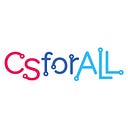CSforALL and the Afterschool Alliance co-hosted a Recent Webinar about Navigating CSforOST During COVID-19
Because of COVID-19, many great resources and opportunities have been shared and generated for virtual learning. Maddy Levine from Girls who Code; Debi Pfitzenmaier from Youth Code Jam; Bessie Miller from Birmingham Public Library; and Jeff Cole from Beyond School Bells shared their organization’s response and best practice recommendations for navigating and facilitating CS enrichment at home.
You can view the full webinar and powerpoint on our CSforALL Vimeo channel.
Webinar Highlights:
Since the pandemic began, Girls who Code has developed curriculum for families, teachers, and students for learning coding at home. The free afterschool and summer clubs are available for 3–12th grade students and include activities that don’t require WiFi. In addition, Girls Who Code hosts facilitator webinars to support best virtual practices on running clubs.
- Best practices for facilitators: maintain connection, be prepared, and run a test/practice session.
Youth Code Jam’s focus is on interest-based learning which has enabled them to take material from art to legos to animals and teach young people new skills in meaningful and relevant ways. They emphasize self-directed learning that gives students choice, and allows them to tinker, learn, and create. They first created unplugged activities called brain breaks/recess in English and Spanish that baked in computational thinking and computer science skills.
- Best practices for virtual learning: 45 minutes max, build in socio-emotional learning, focus on solutions that will outlast the crisis, and incentivize participation through recognition such a news story, website, or social media.
Birmingham Public Library has traditionally provided face-to-face afterschool and summer learning. Due to the pandemic, the library has launched a variety of online programming and activity packets that can be picked up at the library. Through a citywide initiative, they developed structured sample schedules and activities for education and technology. They recognize that many community members only have access to their mobile devices, and thus created activities that can be done on mobile devices.
- Best practices: self-directed learning, unplugged activities, and intergenerational activities.
Nebraska’s Beyond School Bells afterschool network is one of 50 statewide afterschool networks leveraging partnerships to support policies and actions that result in high quality sustainable afterschool programs. Beyond the Bells typically builds off of school day activities by providing high quality hands-on learning. With schools closing, they created virtual backpacks curated from existing materials as well as developing new materials.
- Best practices: Understanding that families may not be comfortable supporting STEM competencies, Beyond School Bells has used web-based professional development, Click2Science to help non-experts become better facilitators. In addition, they are partnering with college students as virtual STEMentors.
Although it’s been a scramble to move to virtual learning, it’s clear the silver lining has been time:
- Time to listen
- Time for creativity and innovation
- Time for partnerships to support unmet needs.
Did you find this information useful? Are you or someone you know looking for more resources and tools in the CSforALL space? CSforALL has an extended membership community that forms relationships, shares tools, and supports one another’s mission at a national level. Become a CSforALL Member today: https://www.csforall.org/become_a_member/.
Continuously check back on our COVID-19 Response web page for upcoming webinars and support resources.
